Kleros, optional dispute resolution that guarantees smart contracts
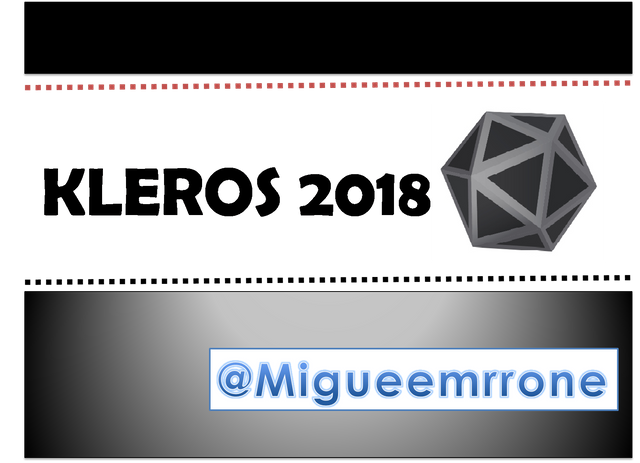
¿ What is Kleros?
Kleros is nothing more than an optional dispute resolution platform, which functions as a decentralized system to third parties, is a decision protocol for a multipurpose court system capable of resolving all types of disputes on the Internet. From the smallest merchant to the largest corporations can make use of Kleros.
Kleros presents a chain of qualified and specialized juries in different classes and it is they who resolve disputes through the use of intelligent contracts and enforce the cases correctly. The result is a dispute resolution course that yields final judgments quickly, economically, reliably and fairly for all.
Disputes are a normal and usual part of any online interaction. Some disputes are conducted through friendly conferences, while others can be terribly long and confrontational for both parties involved.
The award is expensive and time consuming. With Kleros, both parties can be protected in case a contract is breached. Kleros uses crowdsourcing, blockchain and game theory technologies to develop a justice system that produces true decisions in a safe and economical way.


¿How does Kleros work?
Kleros links online to users who need to resolve their disputes with skilled juries capable of solving their disputes quickly, safely, accessible and always fair.
Open collaboration allows access to a global jury community. The blockchain technology guarantees integrity and transparency when selecting juries.
With Kleros the correct final judgments are issued, because they are based on granting incentives to judges who make correct judgments, using game theory to develop a justice system that produces true decisions in a safe and honest way.
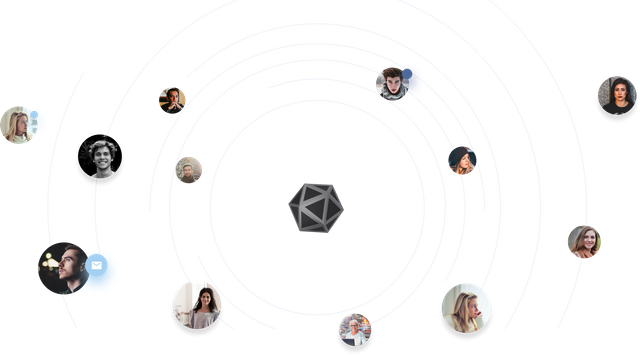

The Current State of Dispute Resolution
Currently with the advent of technology, there is an increased number of small businesses. This also means that there is a growing number of cases of individuals making intelligent contracts, but when one of the parties breaks it, the costs of bringing the party that breached the contract to court are costly, cumbersome and slow. Therefore it is not worth filing a lawsuit because the cost of bringing it to court exceeds the cost of the contract. What makes it unfair to the company or the individual who is affected by the situation when it comes to small amounts of money.
In the current state of dispute resolution, there is no cost-effective and just solution. Many independent websites often offer poor resolution protocols that lead to an unfair assessment by an unqualified person in space, which often results in unfair resolutions leaving one party with a complete loss.


Kleros: Resolution mechanism
The Kleros resolution mechanism is composed of subcourts defined by categories.
After the creation of a contract, the parties involved would select the details of their integration with Kleros. They would select:
• Number of juries
• Contract category (subcourt)
• Results
By choosing the most appropriate subcourt, users can rest assured knowing that if a dispute arises, it will be treated by people informed in the space. In case of a dispute, the juries will receive a series of possible results to choose from.
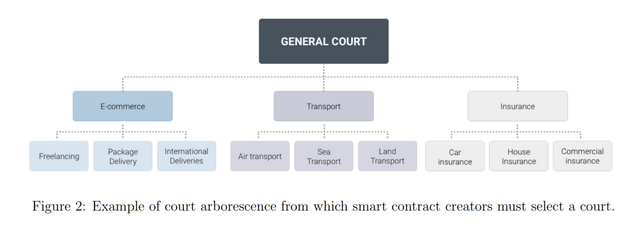

Kleros Experiement: Live
Kleros has launched an experiment to show how it works.
As you can see, the Doges are loaded on the website and users can question whether it is a Doge or not.
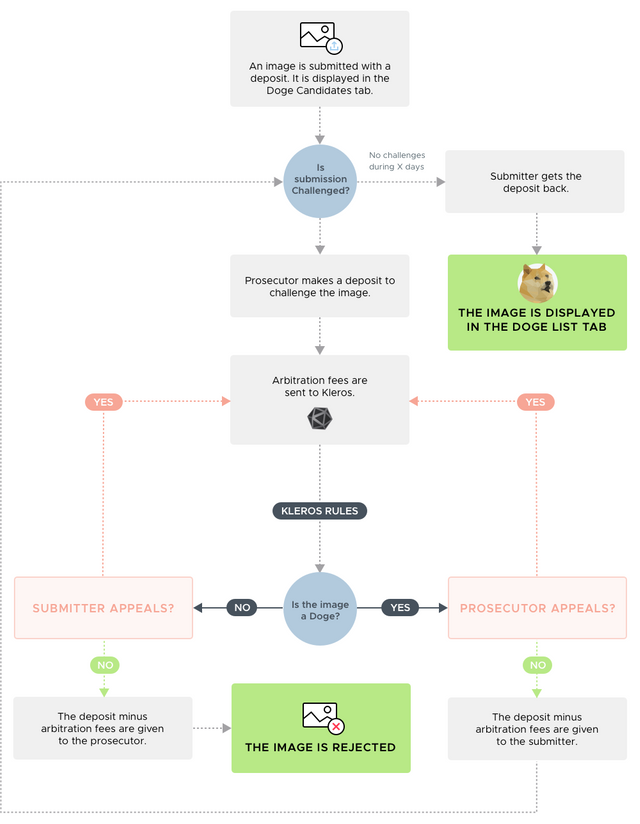
The graph above shows the entire decision-making process associated with whether a Doge is sent or not. The process represents several appeals and, at the same time, is efficient for cases where disputes do not arise. This is just a fun experiment.

KlerosIncentive System
Kleros presents an incentive system where they affirm that, although the prices of resolution of disputes are low, the qualifying judges receive in the same way an appropriate compensation to continue doing an excellent job.
Users have an economic interest in serving as jurors in Kleros, as they receive an arbitration fee when they participate as a jury in a disputed contract. Candidates will select themselves to serve as jurors using a token called pinakion (PNK).

For example, if there are five jurors, with outcome options "A" and "B". If four choose "A" and one chooses "B", then option "A" will win. In this case, the one judge who voted "B" would be considered to have voted incoherently. Although one dispute is not very telling, if a judge rules incoherently 90% of the time over 100 instances, clearly they are a poor judge and they would lose tokens.
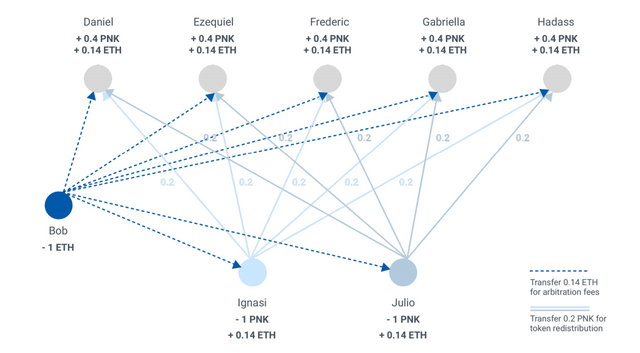
¿How does it work?
For a user to be distinguished as a jury in a specific dispute will depend on the amount of tokens or tokens deposited by the jury, that is, the more tiles you place, the more likely you are to be chosen.
Pinakion has two key functions in the design of Kleros. First, they protect the system against sibylla attacks. Secondly, it provides the members of the jury with honest votes, since if their votes are inconsistent with those of their peers, they must deliver their deposits to those who voted correctly.

Klerosuse covers
For example:
Juan has a small bakery around New York. Because it is an extremely small bakery with no sign that identifies it, it does not have a lot of customers, it only manages thanks to the few faithful followers that it has won over time. Juan decides it is time to do renovation work.

The contractor quotes them at $ 5000, including labor and materials. It also guarantees that the work will be finished in less than two weeks.
Juan decides to accept this offer, and very excited, since he is $ 2000 below what he expected to pay.
As the contractor does not have much reputation, as a precaution, they use Kleros to establish an intelligent contract that protects him in case he can not fulfill his obligations.
The first day, the contractor does not appear. He said he did not feel very well, but do not worry, he will arrive early the next day.
A week goes by, and the contractor showed up just once, took some measurements and left.
At this point, Juan is concerned that the work is not over. But since the established two-week period is not over, it's still waiting.

A. Return the total amount to Juan
B. Pay the total sum to the contractor
C. Split 50/50
The verdict returns in three days, with the five of the five juries that choose the "A" option. Instead of having to deal with an irresponsible second part or going through an official dispute channel, you can solve this problem quickly and efficiently.
The system is guaranteed by intelligent contracts, so the verdict will result in an instant refund! Kleros is the best option to protect your business.
For more information watch this short feature intro:
More information and resources:
• Sitio web de Kleros
• Kleros WhitePaper
• Kleros Medium
• Kleros YouTube
• Kleros Telegram
• Kleros Twitter
• Kleros Github
• Foros de Kleros


://cdn.steemitimages.com/DQmadgmLcEr9q6EWezWJ5HF36W85J2hnv3hAk5S7wEJ6fh6/Untitled-3.jpg)
The contest in case you want to participate: LINK
https://twitter.com/MigueeMrron/status/1031646987580530688

klerostwitter
kleros2018
This post has been submitted for the @OriginalWorks Sponsored Writing Contest!
You can also follow @contestbot to be notified of future contests!